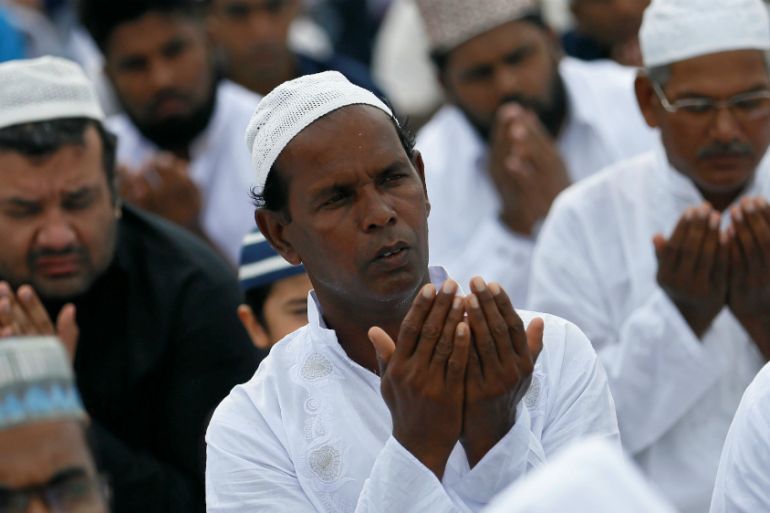Sri Lanka: Buddhist leader stokes anti-Muslim tension
Spate of recent mosque and Muslim-business attacks blamed on hard-line Buddhist leader who is now on the run.

A manhunt is on in Sri Lanka for a hard-line Buddhist leader after a series of attacks on mosques and Muslim-owned businesses that authorities accuse him of encouraging.
President Maithripala Siresena had vowed to investigate anti-Muslim hate crimes after assuming power in 2015, however, attacks have escalated over the past two weeks. Another Muslim shop in the town of Kahawatte was reportedly burned to the ground this week by unidentified attackers.
Keep reading
list of 4 itemsSikh leaders welcome arrests in Canada activist killing, but questions loom
Photos: Ukraine marks its third Easter at war
Israeli police detain Greek consul’s guard at Orthodox Easter ceremony
Bodu Bala Sena (BBS) General-Secretary Galagoda Atte Gnanasara has encouraged his Buddhist supporters to lead another campaign against Muslims following the deadly Aluthgama riots in June 2014, which attempted to create disunity between Buddhists and Muslims.
Less than 10 percent of Sri Lanka’s population of 20 million are Muslim. The majority are Sinhalese Buddhist, while most Tamils are Hindu.
![A broken window at the vandalised Kurenegala Mosque [Ashar Careem/Al Jazeera]](/wp-content/uploads/2017/05/a2ebea1332484797a48205ca46bf43e0_18.jpeg)
Political analyst Amjad Mohamed Saleem told Al Jazeera it was worrisome that violent Buddhist nationalism had re-emerged.
“If the government doesn’t address this issue, it will spill over. We all know the ramifications of these types of tensions that are unchecked. The government has to respond with rule of law and justice if it wants to assure communities it’s not behind it [violence],” said Saleem.
A number of Sri Lankan Muslim ministers urged Siresena to take action this week in critical comments, and a meeting was arranged on Thursday to discuss a move to arrest Gnanasara, who is currently in hiding.
A Sri Lankan court has now issued a warrant for his arrest.
“The BBS secretary-general has re-started this anti-Muslim campaign as he himself was having problems with the police … for going against the authorities in a number of incidents,” Hilmy Ahamed, vice president of the Muslim Council of Sri Lanka, told Al Jazeera.
“Gnanasara … wants to re-start his campaign to fuel tensions in the country. What he is trying to do now is to give the impression to the majority Buddhists that he will be imprisoned indefinitely due to Muslim complaints against him and his group. He is driving the attention away from his crimes.”
READ MORE: Sri Lanka shaken by religious violence
Ahamed also accused BBS activists of intimidating the Muslim community.
“They have attacked holy places of worship such as our mosques and destroyed Muslim property and livelihoods… The problem was that the government had been lenient all this time towards the BBS crimes these last two weeks,” he said.
![The charred walls of the Kurenegala Mosque after being hit by petrol bombs [Ashar Careem/Al Jazeera]](/wp-content/uploads/2017/05/e60241aa2d1846de8640e7f62e56f043_18.jpeg)
Azath Salley, an advisor to the government, told Al Jazeera the Buddhist hardliners were allowed to flourish under the previous administration.
“The BBS had been very active in the last regime of Mahinda Rajapakse and have done damage to unity and created many problems for Muslims in the country. With the new President Siresena we hoped that improvements would be made to facilitate peace within the country.
“We had to bring in pressure to the government in order to take this case up against the BBS, and I am glad that finally action is being taken with special teams being deployed to find Gnanasera,” he said.
Salley noted the country’s devastating 26-year civil war with the Liberation Tigers of Tamil Eelam (LTTE) and said he didn’t want to see any return of violence.
“As a politician, I am concerned about the tensions escalating. We are peace-loving people and we do not want another calamity after Sri Lanka already went through a war with the LTTE. We want coexistence and peace in the community. I am glad the government has realised that he [Gnanasera] is a threat to national security.”
WATCH: Who is behind Sri Lanka’s religious violence?
Amanthi Ratanakaye, 48, is a Sinhalese mother who said the BBS group does not represent the majority of Buddhists in the country.
“We want to live peacefully and we do not support the acts that are done on our fellow Muslim neighbours,” she told Al Jazeera.
“They do not represent us, but they are worryingly influencing our young, which is why action must be taken against them.”
|
|